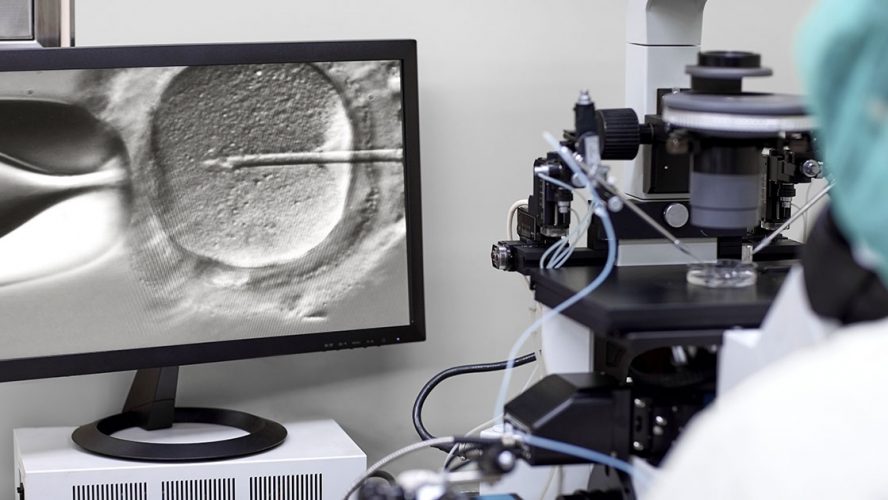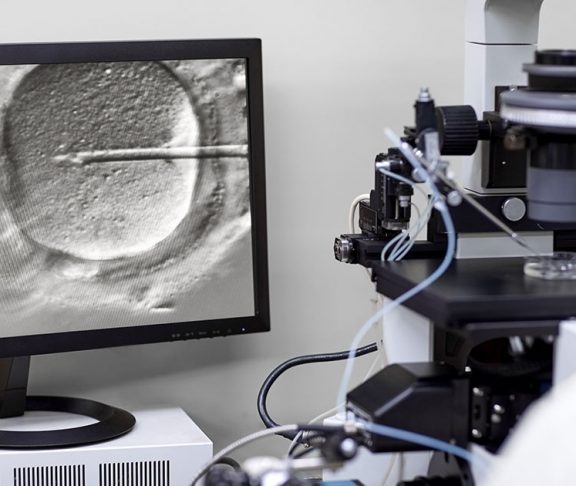Medical and technological advancements have expanded family building options, including surrogacy and egg, sperm and embryo donation. Working with experienced legal professionals paves the way to successful, secure outcomes.
The Academy of Adoption and Assisted Reproduction Attorneys offers these brief descriptions of the various third-party reproduction methods:
- Gestational surrogacy (or gestational carrier) arrangements: A woman agrees to carry a pregnancy for an intended parent or parents: the surrogate is not genetically related to the baby. Here, the child is conceived using an embryo created in vitro with genetic material provided by the intended parents or donors. The embryo is placed into the uterus of the gestational surrogate, who then carries the pregnancy and delivers the baby. When the baby is born, the surrogate gives immediate custody and care to the intended parents and, usually, a court order directs parentage of the child.
- Traditional or genetic surrogacy: The surrogate is artificially inseminated with the sperm of the intended father or a donor. The surrogate carries the pregnancy, delivers the baby and places the child with the intended parent(s). The surrogate is a genetic parent, and for that reason, in most jurisdictions, this form of surrogacy carries greater legal risk and parental rights may not be so quickly or easily resolved.
In order to secure the appropriate protections for all types of surrogacy arrangements, prevent disputes and to efficiently manage the parentage issues, there must be a written agreement between the parties. An important part of this process is independent representation for the intended parents and for the surrogate. An experienced ART attorney can thoroughly explain the application of local law and the processes involved in these arrangements and can expertly navigate that path to parenthood.
There are two types of international surrogacy cases: (1) incoming cases (meaning intended parents bring their child born through surrogacy into the United States; and (2) outgoing cases (meaning a child is born in the United States and is leaving the United States to live with the intended parents abroad).
- Incoming Surrogacy Cases: Incoming surrogacy cases are relatively unregulated, and some of the practices that have developed abroad can be frightening. Children have been left stateless, parentless, or both in the destination countries. Intended parents have been stranded in a foreign country with their newborns when the local courts would not recognize their parental status. There are also grave concerns about the exploitation of impoverished women in some countries.
Most recently, travel bans and restrictions due to the pandemic have greatly complicated the international surrogacy scenario. Parents coming into the United States from most other countries were subject to strict regulations and entry bans. Children born through surrogacy arrangements were unable to obtain their U.S. passports, which meant, in many cases, that they could not leave the country. Fortunately, the ART legal community collectively crafted solutions that eased these situations for most families.
Often U.S. citizens travel abroad for surrogates and fertility treatments because they think it will be less expensive. This is not always true for a variety of reasons. For instance, if the child has medical problems at birth, the intended parents will be responsible for the expense of a long-term stay or costly arrangements to transport a sick child home. Also, attorney fees to address the U.S. immigration status and citizenship of the child have to be factored into any cost estimate. The Academy of Adoption and Assisted Reproduction Attorneys (AAAA) strongly warns any individual considering an international surrogacy or ART arrangement to consult with a U.S. attorney who is experienced in these matters.
Experienced attorneys should discuss the different destination countries, reputable fertility clinics and coordinating programs, and how to ensure that the arrangements are conducted ethically and morally for all participants. They should also present a strategy to ensure that the child has secure parentage and the appropriate immigration status or citizenship in the United States after birth.
- Outgoing Surrogacy Cases: These individuals should have an attorney in the United States, in the state where the surrogate resides. Foreign intended parents are also strongly cautioned to retain an attorney in their home country to address the child’s parentage and citizenship; in fact, some U.S. surrogacy attorneys will require any foreign intended parent-clients to have this type of consultation prior to proceeding with the case.
- International ART Arrangements Other Than Surrogacy: International ART arrangements other than surrogacy, such as when a U.S. citizen travels abroad for egg donation and/or in vitro fertilization (IVF) and embryo transfer, can also create complex immigration and parentage issues, depending on the countries involved. Anyone considering an ART procedure above should consult with a U.S. immigration and ART attorney prior to any medical procedures taking place.
- Egg Donation: In egg donation, a donor agrees to undergo screening, monitoring, and an egg retrieval procedure. She donates the eggs to a certain recipient, or to an egg bank for later donation to the bank’s clients. It is generally acceptable to work with a donor who is known to the recipient through family, friend, or community connections, but most intended parents find a donor through a matching program. Traditionally, this process was anonymous but more open arrangements are now becoming the norm. Also, because of at-home DNA testing and widespread information on the internet, truly anonymous donation is not a guarantee. It is now common for donation contracts to address future contact between the donor and the donor-conceived person. There are relatively few laws that govern egg donation: any applicable law should be identified and carefully followed. In any event, it is best practice and protection for each party to have independent legal representation, psychological screening, and a written agreement. Your doctor may require this.
- Sperm Donation: Most intended parents use sperm banks (cryobanks) to find a donor. Traditionally, this process was treated as anonymous but, because of at-home DNA testing and widespread information on the internet, truly anonymous donation is not a guarantee. Now, the trend is swiftly moving toward more open arrangements. This means that the donor is asked if he is amenable to contact from the parent, the child (as an adult), or both, and this preference is listed in his profile. It is also generally acceptable to work with a donor who is known to the recipient through family, friend, or community connections. Many states have very specific laws about sperm donation, and it is important that the parties comply so that the donor does not have parental rights. In arrangements with a known donor, it is best practice and provides optimum protection for each party to have an independent attorney, psychological screening, and a written agreement. Your doctor may require this.
- Embryo Donation: Sometimes, IVF patients have leftover embryos they wish to donate to someone else for reproduction. Intended parents may learn of this through their fertility center, online communities, connections within their own circle of friends and family, or from embryo donation centers. If an intended parent locates embryos through the fertility doctor or a donation center, the donors are likely to have waived their rights. However, in any situation where the donor still maintains ownership of the embryos, there must be a written contract between the intended parent and the donors to, among other things, resolve rights to the embryos. It is best practice, and may also be required by the facility center, to have independent representation and a psychological consultation. There are a few states that have laws about embryo donation, and they must be identified and followed where applicable.
LGBT couples and individuals have varied needs for assisted reproductive technologies (ART) to assist in building their families.
Lesbian couples and single lesbians will need to use sperm donation to achieve pregnancy. They may also consider using donated embryos or creating their own embryos through in vitro fertilization (IVF) using donor sperm and the eggs of the woman or if a couple, the eggs of one of the women. With this process, one of the women may contribute the eggs and the other woman might gestate the pregnancy.
Gay men will need egg donors to create embryos and then will need gestational carriers to carry their embryos.
Transgender people may seek to preserve their fertility by moderating hormone therapy when they want to have children or may retrieve and store sperm or eggs awaiting the decision to parent.
What all LGBT persons share when accessing ART is the need for experienced lawyers so that their choices will result not only in them being able to have children, but also that their parental rights to those children are secured. Laws vary by state on how a “donor” is defined and how people can obtain parental rights through donation and surrogacy. There are also some states that still do not permit LGBT couples or single people to enter into enforceable surrogacy contracts, sometimes because of restrictions defined by marital relationships or genetic connection to the child.
A Fellow of the Academy of Adoption and Assisted Reproduction Attorneys (AAAA) can help identify the laws and policies that may affect a person’s ability to use assisted reproduction for family building. Our lawyers provide informed, reliable advice to guide clients all along the pathway to parenthood. AAAA attorneys stand ready to assist clients as they embark on their reproductive journeys, whether they are intended parents, surrogates or donors. A state-by-state listing of experienced ART attorneys can be found on our website at www.adoptionart.org.

